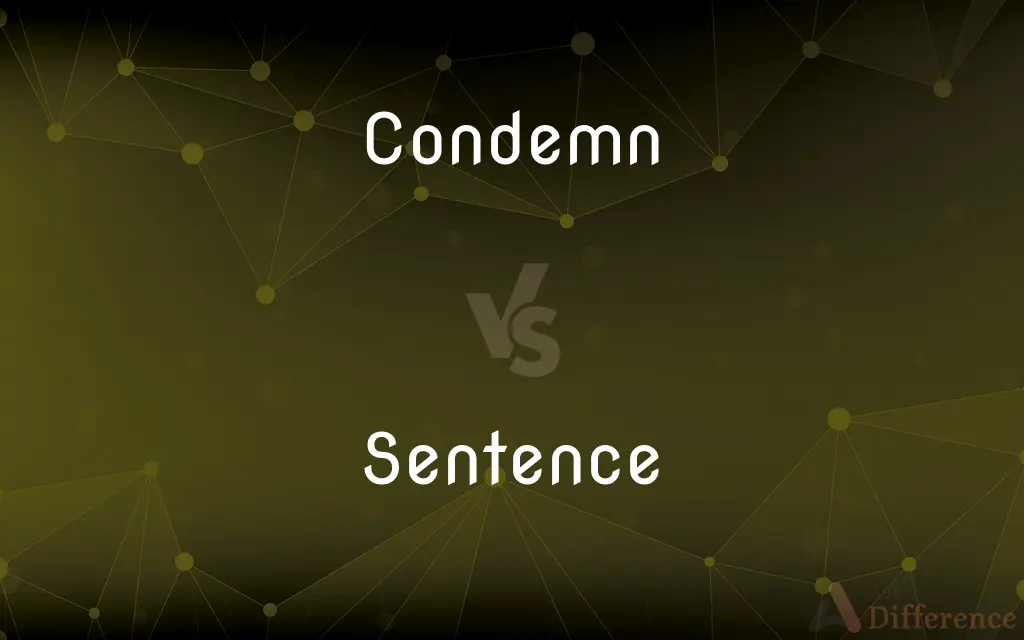Condemn vs. Sentence — What's the Difference?

Difference Between Condemn and Sentence
ADVERTISEMENT
Compare with Definitions
Condemn
Express complete disapproval of; censure
The plan was condemned by campaigners
Most leaders roundly condemned the attack
Sentence
A grammatical unit that is syntactically independent and has a subject that is expressed or, as in imperative sentences, understood and a predicate that contains at least one finite verb.
Condemn
Sentence (someone) to a particular punishment, especially death
The rebels had been condemned to death
Sentence
The penalty imposed by a law court or other authority upon someone found guilty of a crime or other offense.
Condemn
To express strong disapproval of
Condemned the needless waste of food.
ADVERTISEMENT
Sentence
(Archaic) A maxim.
Condemn
To pronounce judgment against; sentence
Condemned the felons to prison.
Sentence
(Obsolete) An opinion, especially one given formally after deliberation.
Condemn
To judge or declare to be unfit for use or consumption, usually by official order
Condemn an old building.
Sentence
To impose a sentence on (a criminal defendant found guilty, for example).
Condemn
To force (someone) to experience, endure, or do something
"Those who cannot remember the past are condemned to repeat it" (George Santayana).
Sentence
(dated) The decision or judgement of a jury or court; a verdict.
The court returned a sentence of guilt in the first charge, but innocence in the second.
Condemn
To lend credence to or provide evidence for an adverse judgment against
Were condemned by their actions.
Sentence
The judicial order for a punishment to be imposed on a person convicted of a crime.
The judge declared a sentence of death by hanging for the infamous child rapist.
Condemn
(Law) To appropriate (property) for public use.
Sentence
A punishment imposed on a person convicted of a crime.
Condemn
(transitive) To strongly criticise or denounce; to excoriate the perpetrators of.
The president condemned the terrorists.
Sentence
(obsolete) A saying, especially from a great person; a maxim, an apophthegm.
Condemn
(transitive) To judicially pronounce (someone) guilty.
Sentence
(grammar) A grammatically complete series of words consisting of a subject and predicate, even if one or the other is implied, and typically beginning with a capital letter and ending with a full stop or other punctuation.
The children were made to construct sentences consisting of nouns and verbs from the list on the chalkboard.
Condemn
(transitive) To judicially announce a verdict upon a finding of guilt; To sentence
The judge condemned him to death.
She was condemned to life in prison.
Sentence
(logic) A formula with no free variables.
Condemn
(transitive) To confer eternal divine punishment upon.
Sentence
(computing theory) Any of the set of strings that can be generated by a given formal grammar.
Condemn
(transitive) To adjudge (a building) as being unfit for habitation.
The house was condemned after it was badly damaged by fire.
Sentence
(obsolete) Sense; meaning; significance.
Condemn
(transitive) To adjudge (building or construction work) as of unsatisfactory quality, requiring the work to be redone.
Sentence
(obsolete) One's opinion; manner of thinking.
Condemn
(transitive) To adjudge (food or drink) as being unfit for human consumption.
Sentence
A pronounced opinion or judgment on a given question.
Condemn
To declare something to be unfit for use, or further use.
Sentence
To declare a sentence on a convicted person; to condemn to punishment.
The judge sentenced the embezzler to ten years in prison, along with a hefty fine.
Condemn
(transitive) To determine and declare (property) to be assigned to public use. See eminent domain.
Sentence
To decree, announce, or pass as a sentence.
Condemn
To declare (a vessel) to be forfeited to the government, to be a prize, or to be unfit for service.
Sentence
(obsolete) To utter sententiously.
Condemn
To pronounce to be wrong; to disapprove of; to censure.
Condemn the fault, and not the actor of it!Why, every fault's condemned ere it be done.
Wilt thou condemn him that is most just?
Sentence
Sense; meaning; significance.
Tales of best sentence and most solace.
The discourse itself, voluble enough, and full of sentence.
Condemn
To declare the guilt of; to make manifest the faults or unworthiness of; to convict of guilt.
The queen of the south shall rise up in the judgment with this generation, and shall condemn it.
Sentence
An opinion; a decision; a determination; a judgment, especially one of an unfavorable nature.
My sentence is for open war.
That by them [Luther's works] we may pass sentence upon his doctrines.
Condemn
To pronounce a judicial sentence against; to sentence to punishment, suffering, or loss; to doom; - with to before the penalty.
Driven out from bliss, condemnedIn this abhorred deep to utter woe.
To each his sufferings; all are men,Condemned alike to groan.
And they shall condemn him to death.
The thief condemned, in law already dead.
No flocks that range the valley free,To slaughter I condemn.
Sentence
A philosophical or theological opinion; a dogma; as, Summary of the Sentences; Book of the Sentences.
Condemn
To amerce or fine; - with in before the penalty.
The king of Egypt . . . condemned the land in a hundred talents of silver.
Sentence
In civil and admiralty law, the judgment of a court pronounced in a cause; in criminal and ecclesiastical courts, a judgment passed on a criminal by a court or judge; condemnation pronounced by a judicial tribunal; doom. In common law, the term is exclusively used to denote the judgment in criminal cases.
Received the sentence of the law.
Condemn
To adjudge or pronounce to be unfit for use or service; to adjudge or pronounce to be forfeited; as, the ship and her cargo were condemned.
Sentence
A short saying, usually containing moral instruction; a maxim; an axiom; a saw.
Condemn
To doom to be taken for public use, under the right of eminent domain.
Sentence
A combination of words which is complete as expressing a thought, and in writing is marked at the close by a period, or full point. See Proposition, 4.
He fills, he bounds, connects, and equals all.
A king . . . understanding dark sentences.
Condemn
Express strong disapproval of;
We condemn the racism in South Africa
These ideas were reprobated
Sentence
To pass or pronounce judgment upon; to doom; to condemn to punishment; to prescribe the punishment of.
Nature herself is sentenced in your doom.
Condemn
Declare or judge unfit;
The building was condemned by the inspector
Sentence
To decree or announce as a sentence.
Condemn
Compel or force into a particular state or activity;
His devotion to his sick wife condemned him to a lonely existence
Sentence
To utter sententiously.
Condemn
Demonstrate the guilt of (someone);
Her strange behavior condemned her
Sentence
A string of words satisfying the grammatical rules of a language;
He always spoke in grammatical sentences
Condemn
Pronounce a sentence on (somebody) in a court of law;
He was condemned to ten years in prison
Sentence
(criminal law) a final judgment of guilty in a criminal case and the punishment that is imposed;
The conviction came as no surprise
Sentence
The period of time a prisoner is imprisoned;
He served a prison term of 15 months
His sentence was 5 to 10 years
He is doing time in the county jail
Sentence
Pronounce a sentence on (somebody) in a court of law;
He was condemned to ten years in prison
Share Your Discovery

Previous Comparison
Immigrant vs. Emigre
Next Comparison
Overcast vs. Cloudy














































